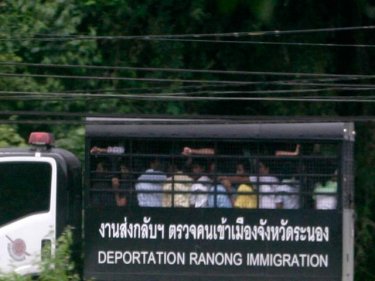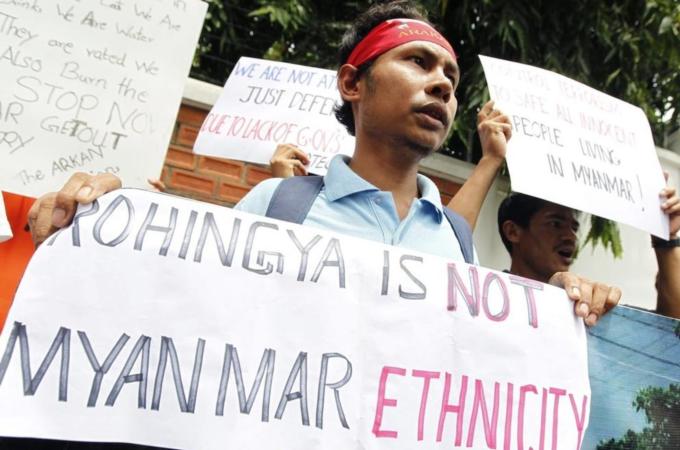Wartime Abuses in Kachin State, “Ethnic Cleansing” in Rakhine State, Tens of Thousands Denied Access to Aid
(Bangkok, October 9, 2013) — The United Nations General Assembly
should adopt a strong and comprehensive resolution on the situation of
human rights in Myanmar to promote much-needed human rights reform in
the country, Fortify Rights said today. When it considers a forthcoming
resolution on Myanmar, the UN General Assembly should condemn the wide
range of ongoing human rights violations by the government and armed
forces of Myanmar and provide clear benchmarks for measurable
improvement, including establishing the presence of the UN Office of the
High Commissioner for Human Rights (OHCHR) in Myanmar.
“Positive political changes have come to Myanmar but the human rights
situation is deeply concerning,” said Matthew Smith, executive director
of Fortify Rights. “The pending resolution should acknowledge Myanmar’s
political progress but shouldn’t gloss over the immense amount of work
that remains to be done.”
On December 24, 2012, the UN General Assembly adopted
resolution 67/233
to focus attention on ongoing human rights abuses in Myanmar while
noting significant progress underway within the country. The 2012
resolution expressed concern about “arbitrary detention, forced
displacement, land confiscations, rape and other forms of sexual
violence, and torture and cruel, inhuman and degrading treatment, as
well as violations of international humanitarian law.” It called for the
government of Myanmar to “ensure accountability and end impunity” for
violations of international human rights and humanitarian law.
The human rights violations articulated in the UN General Assembly’s
2012 resolution remain prevalent in Myanmar, and impunity continues,
Fortify Rights said.
Recent investigations by Fortify Rights in the conflict zones of
Kachin State and northern Shan State—where the Myanmar army and Kachin
Independence Army (KIA) have fought a deadly war since June 2011—reveal
entrenched impunity for abuses perpetrated by the Myanmar army, such as
extrajudicial killings, abusive forced labor, rape and sexual violence.
Fortify Rights documented abuses perpetrated by the Myanmar army in
recent months, including violations of international humanitarian law,
such as extrajudicial killings, failure to adequately protect civilian
life, and the use of forced labor. Both the Myanmar army and the KIA
continue to recruit and use child soldiers, and to deploy antipersonnel
landmines throughout the conflict zone. Neither party has taken
significant steps to address these abuses.
"The Myanmar army’s targeted abuses against civilians in situations
of armed conflict must be brought to an end and perpetrators should be
held accountable, and the resolution should clarify that," said Matthew
Smith. “Impunity for wartime abuses will be a serious obstacle to
lasting peace in Kachin State and should be clearly addressed.”
More than 100,000 Kachin have been forcibly displaced since June
2011, and at least 65,000 have fled to 51 camps in KIA-held territory,
where the government of Myanmar continues to deny access to
international humanitarian agencies. Since June 2011, UN agencies have
only been authorized by the government to provide minimal short-term aid
deliveries to 20 percent of those displaced in KIA-controlled
territory, according to the UN Office for the Coordination of
Humanitarian Affairs (OCHA). Kachin civil society, Kachin faith-based
organizations, and the Kachin Independence Organization—the political
wing of the KIA—have led the relief effort and attempted to fill
humanitarian gaps with limited resources.
The UN General Assembly should urge Myanmar to heed its 2012 call for
the government to abolish all restrictions on humanitarian access to
displaced persons in dire need of aid—including those in Kachin, Shan,
and Rakhine states.
The UN General Assembly should also condemn the ongoing “ethnic
cleansing” of the Rohingya and Kaman Muslim population and call for the
establishment of an independent international investigation into ongoing
human rights violations against Muslims in Rakhine State. In December
2012, the UN General Assembly “express[ed] its serious concern” over the
situation in Rakhine State, and violence and abuse in the state has
since continued. Anti-Muslim violence has spread throughout Myanmar,
fueled by nationalist-Buddhist extremism, and it erupted again on
September 29 in Rakhine State’s Thandwe Township, where security forces
failed to protect Kaman Muslim communities from targeted arson attacks.
Tens of thousands of internally displaced Rohingya Muslims in Rakhine
State still lack access to adequate humanitarian aid, and more than
35,000 Rohingya in 113 isolated villages are in need of urgent aid,
according to OCHA. The UN General Assembly must call upon the government
of Myanmar to ensure that aid reaches these groups in dire need without
delay.
The majority of an estimated one million Rohingya Muslims are
effectively denied access to citizenship through Myanmar’s controversial
1982 Citizenship Act. The government further applies abusive
restrictions on the daily lives of Rohingya, including on their right to
freedom of movement, religion, education, livelihood, and marriage. The
UN General Assembly should press the government of Myanmar to amend the
1982 Citizenship Act to bring it in line with international standards
and to lift all abusive restrictions on ethnic and religious minorities,
including Muslims, Fortify Rights said.
The UN General Assembly should also address the broader need for law
reform in Myanmar. Despite its progress on political reforms, Myanmar
still enforces laws and policies that fail to meet international human
rights standards. For instance, various provisions in the Penal Code,
the Peaceful Assembly Law, the Electronic Transactions Act, and the
Unlawful Associations Act are used as pretexts to restrict basic
freedoms and are inconsistent with international human rights standards.
Draft legislation, such as the Law on the Formation of
Organizations—which is currently under consideration by the
Parliament—further threatens basic freedoms. Article 445 of the Myanmar
Constitution also requires urgent attention to remove the codification
of impunity for state actors who may have committed grave human rights
abuses.
In November 2012, President Thein Sein promised US President Barack
Obama his government would permit the UN Office of the High Commissioner
for Human Rights (OHCHR) to establish a presence in the country, but
his government has since stalled efforts to do so. The General Assembly
should recommend that the government of Myanmar make good on its
commitment and invite the OHCHR to establish a presence in the country
with a full human rights protection, promotion, and technical assistance
mandate.
On July 15, Burmese President Thein Sein committed to free all
prisoners of conscience by the end of 2013. Scores of activists
throughout the country, however, have since been arrested and prosecuted
for exercising their human rights. This includes two staff members of
the Human Rights Defenders and Promoters— U Aung Myint, age 44, and Hla
Myo Naing, age 34—who were arrested in Irrawaddy Region on September 5
and September 17, respectively, after providing awareness-raising
trainings on human rights to local communities. Other arrests since the
President’s July statement include: Naw Ohn Hla, 52, a prominent
activist sentenced on August 29 to two years hard labor for protesting a
Chinese-led copper mine in Sagaing Region; U Kyaw Hla Aung, 74, a
prominent Rohingya lawyer, human rights defender, and longtime
humanitarian worker arbitrarily detained in Sittwe, Rakhine State on
July 15; and ten Rakhine activists who were convicted for peacefully
protesting a Chinese-led natural gas project and sentenced on September
26 to three months in prison.
The UN General Assembly should encourage the government of Myanmar to
make good on its promise to clear Myanmar’s jails of prisoners of
conscience by not only freeing all prisoners of conscience and political
prisoners but also affording all prisoners due process rights and
ensuring humane treatment in conformity with international standards,
Fortify Rights said.
The UN General Assembly should strengthen its 2012 call for Myanmar
to become a party to international instruments in the fields of human
rights, labor law, refugee law, and humanitarian law. The UN General
Assembly should urge the government of Myanmar to act upon the Myanmar
National Human Rights Commission’s (MNHRC) recommendation in June 2013
that Myanmar ratify both the International Covenant on Civil and
Political Rights and the International Covenant on Economic, Social and
Cultural Rights. In addition, the UN General Assembly must call upon
Myanmar to become a party without reservation to other key treaties to
promote and protect human rights, such as the Rome Statute of the
International Criminal Court, the Convention against Torture and Other
Cruel, Inhuman or Degrading Treatment or Punishment, the 1997 Mine Ban
Treaty, and the International Convention for the Protection of All
Persons from Enforced Disappearance.
The UN General Assembly should also instruct Myanmar to enforce and
uphold the international instruments to which it is already a party,
such as the Geneva Conventions of 1949 governing the protection of
civilians during armed conflict, the Convention on the Rights of the
Child, and the Convention on the Elimination of All Forms of
Discrimination Against Women. It should also recommend that the MNHRC be
established by law in line with the Paris Principles—which were created
by the UN to establish minimum standards for
bona fide national human rights commissions.
Finally, the General Assembly should urge the government of Myanmar
to establish transitional justice mechanisms of accountability and
truth-seeking to address decades of past abuses and enable Myanmar to
abandon the shadow of unresolved grave human rights violations.
“For Myanmar to demonstrate progress on human rights, the government
must embrace and enforce core standards of international human rights
law,” concluded Matthew Smith.
For more information, please contact:
Matthew Smith,
matthew.smith@fortifyrights.org, +66.85.028.0044 (Thailand), @matthewfsmith
Key Recommendations
The Pending UN General Assembly resolution on Myanmar should recommend the government of Myanmar:
- End armed conflict-related abuses, including violations of
international humanitarian law and international human rights law, and
ensure perpetrators of abuse are held to account.
- Ensure immediate and unrestricted humanitarian access to displaced persons.
- Protect at-risk populations, including Muslims, from mob violence
and abuses by security forces, and immediately release individuals who
have been arbitrarily detained without basis during or following
incidents of anti-Muslim violence, unless they are properly charged and
tried in trials that meet international standards of fairness.
- Immediately and unconditionally release all political prisoners.
- Facilitate the establishment of an office of the United Nations
Office of the High Commissioner for Human Rights (OHCHR) in Myanmar with
a full mandate.
- Amend or repeal laws and legislation that are not in line with
international human rights standards, including laws that violate the
right to freedom of expression, peaceful assembly, and association as
well as laws that discriminate against ethnic and religious minorities.
- Adopt international human rights instruments and establish a
mechanism to ensure accountability for past grave human rights
violations.
ABOUT FORTIFY RIGHTS
Fortify Rights is an independent organization that strives to
strengthen the human rights movement through rigorous defense and
protection of human rights. We provide technical support to human rights
defenders and conduct independent monitoring and strategic advocacy. By
independently documenting and exposing human rights violations while
teaming with activists to advocate for change at local, national, and
international levels, we aim to fortify the human rights movement.
We are a non-profit human rights organization based in Southeast Asia
and registered in Switzerland and the United States. Follow us on
Twitter @FortifyRights.
Download the release here (.DOC format)















